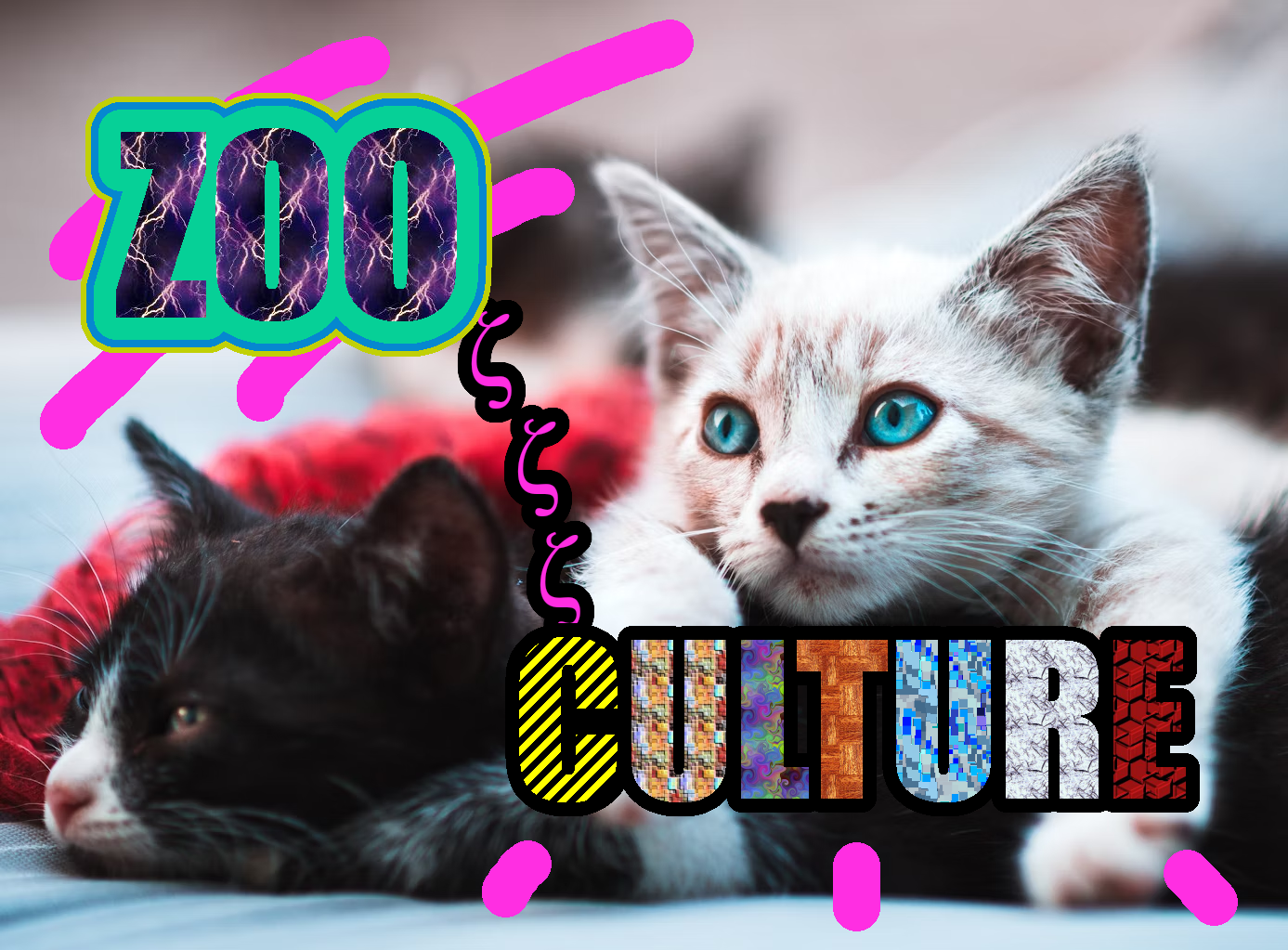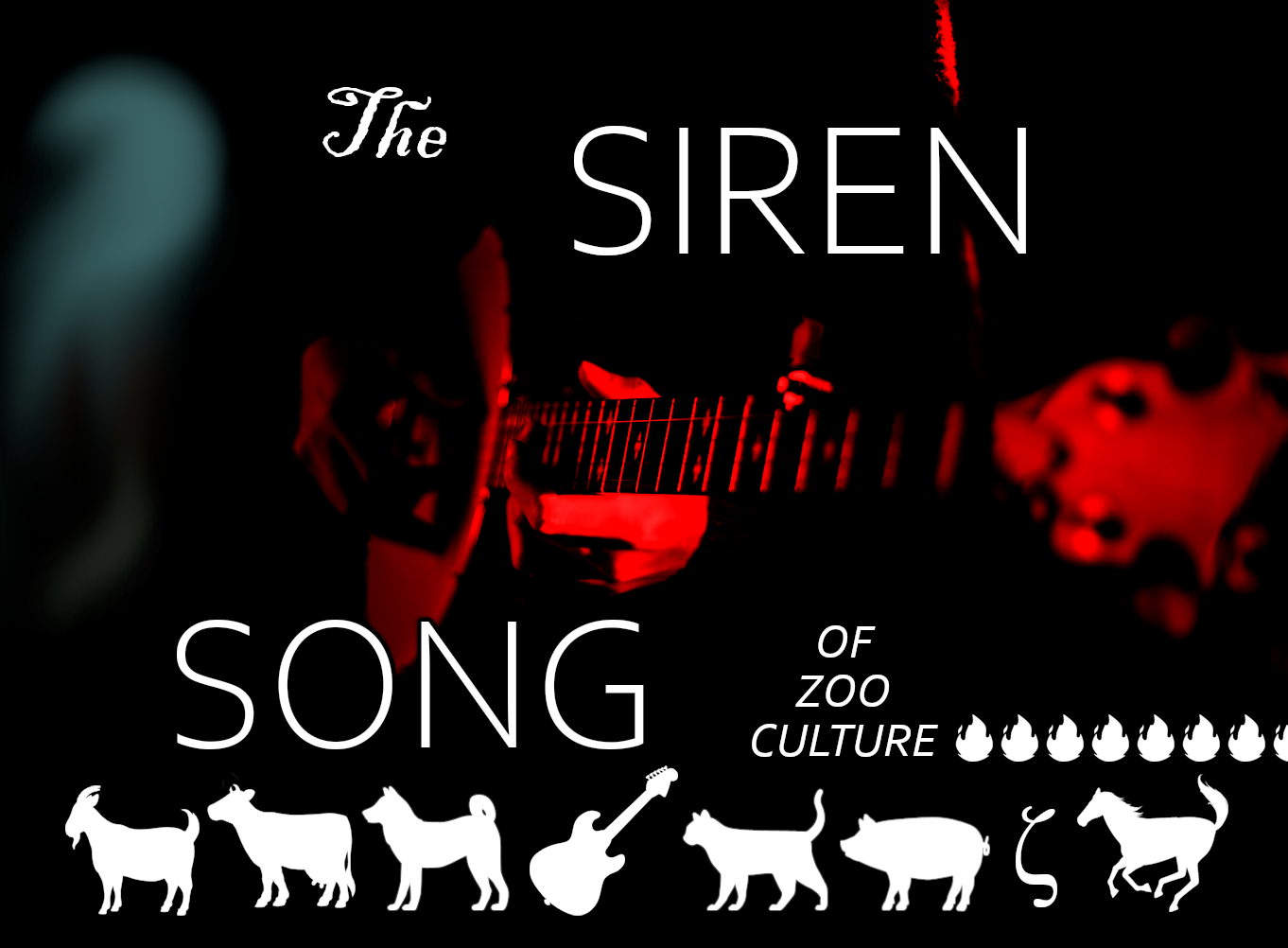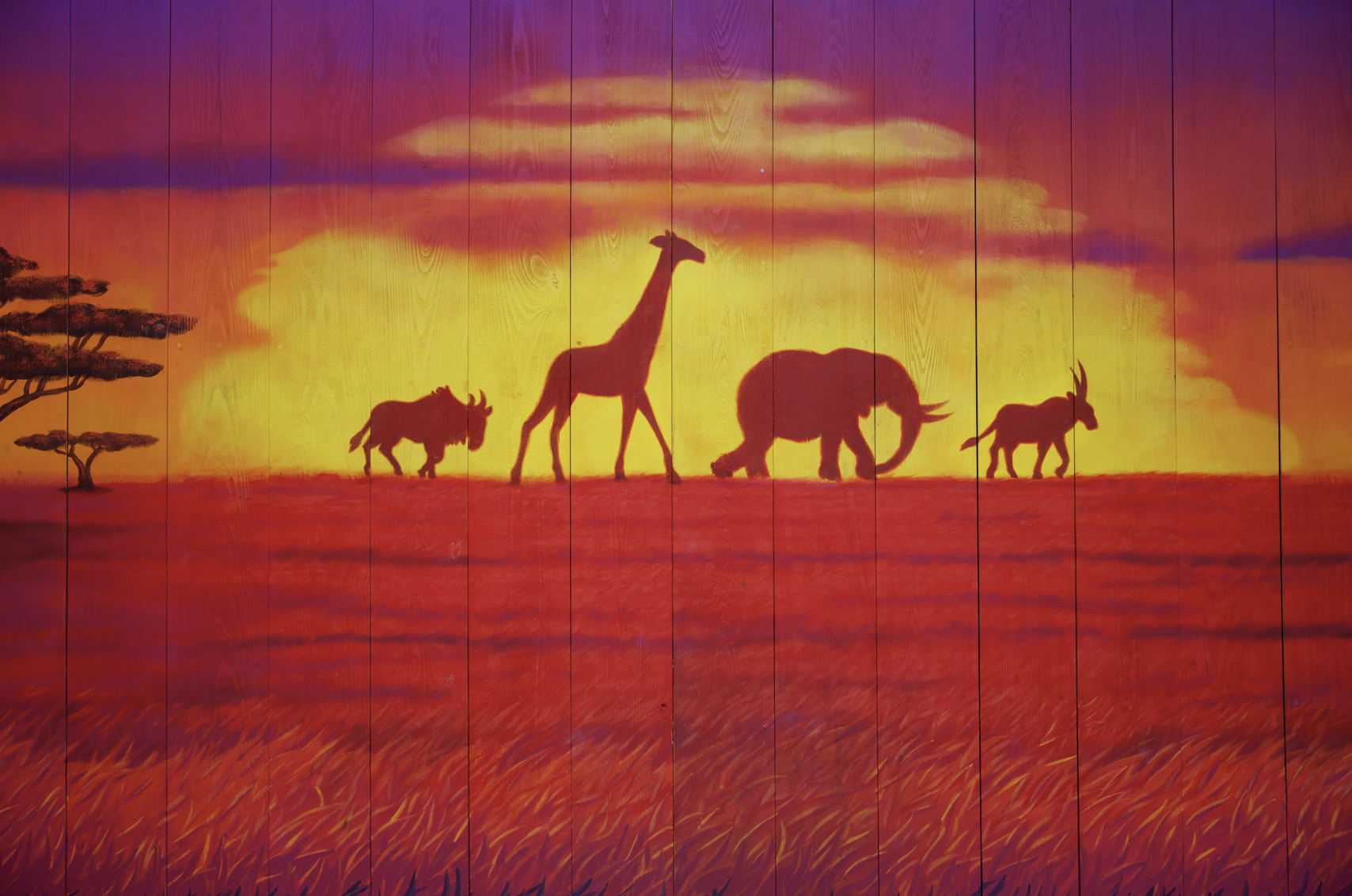Zoo Culture

You know what's pretty cool? Culture. It's basically the building block of society, and yet we never really think about it unless we're travelling or trying something new. Everywhere has culture. State by state, country by country. Hell, even certain cities have a culture that's distinct from the cultures around it. In fact, it's not even just places. Groups can have cultures as well. There's certainly a culture around the furry fandom, and there's a culture in gaming circles. Hell, I would go so far as to say that even your local friend groups have a culture in of themselves that probably would feel foreign and weird to outsiders. And of course, sexualities have cultures as well. You've probably even heard about it before. Queer culture.
Which got me thinking. What's our culture? What's zoosexual culture?
Well, turns out, it's a more complicated question than I thought. The issue with defining culture is that when you exist within a it, it doesn't feel culturally relevant to you. It just feels normal. And when everything's normal, it's hard to define where the bumps are that lead to our unique traits. Not only that, but culture itself is hard to define asis.
And that's when we reach a second big problem. Culture isn't always fully consistnt, and the larger a group you're trying to define the culture of, the more the details are going to get fuzzy. If you're trying to define "gaming" culture, you're going to have a much harder time finding common ground between League of Legends players and Stardew Valley players. Even under the umbrella of gaming, both those things have their own distinct cultures as well. And while the zoo community isn't it's pretty diverse. I would say that there are three major camps that exist in the zoo community. The forum zoos, the Twitter zoos, and the Telegram zoos.
You could probably do a deep dive into each of those spaces individually to pick out the things that make those groups feel unique, but that's past the scope of what we're trying to do here today. The reason I bring this up is because I want to make it clear that in defining culture I'm going to be making a lot of generalizations. ome of th generalizations apply to you. I by no means want to disqualify your experience, everyone is valid. I'm just going based off the most common traits I've personally seen. You're free to disagree. And, likewise, if you're not a zoo and you're just reading this out of interest do not use this as some kind of guide to judge every zoo by. Even as an individual I have differences from the conclusions I'm going to draw here.
Wow, all that sure makes this feel complicated doesn't it! Don't worry, I think even with all that said, we can draw some pretty interesting conclusions here. So, lets start with the basics. What even is culture?
The Oxford Dictionary defines culture as
"The customs, arts, social institutions, and achievements of a particular nation, people, or other social group."
And while I like that definition for the most part, it feels somewhat lacking. At least, in my opinon. When I talk about the "culture" of somewhere like Texas, sure there are customs that build into your picture of what that is, but it doesn't really feel like that definition really encapsulates the totality of what I would consider Texan culture.
Miriam Webster has a definition that I like a lot more, but it's a little longer.
"The customary beliefs, social forms, and material traits of a religious or social group. The characteristic features of everyday existence (such as diversions or a way of life) shared by people in a place or time."
Now this feels like a starting point to me. I think with this set of terms, we can go a lot farther. So let's dive into what the culture of the zoo community is.
Let's just go point by point here. What are our customary beliefs?
Well, for starters, we believe in animal rights. That's something I would consider a pretty heavy part of our collective values. There are definitely some differences in severity. The person who just likes adult content is going to have a different stance than the vegan who volunteers at an animal sanctuary. That said, based on the difference from the general population I would say that caring about animals is definitely something that sets us apart. Also, I think zoos tend to be more likely to be vegan, or at least morally conscious of the fact that eating meat is bad. I know a lot of zoos who aren't vegan but try to limit their meat consumption, or at the very least are much more informed on the topic.
We also tend to be left leaning, relatively progressive, and accepting of other sexualities. Don't get me wrong here, I've met some pretty bigoted zoos as well, but I would say that the vast majority of the time if you ask a fellow animal lover where they stand on trans rights, they're going to be pretty firmly in favor. In fact, I would say that in general zoos tend to be more likely to be LGBTQ in some capacity. And the left lean makes sense, right? We're a persecuted sexuality who feels unjustly demonized. That's very similar to what the right wing has done to other sexualities and identities. Logically, it makes sense we would push back against discrimination. For similar reasons, zoos tend to not ascribe to any religion based off the history of religion being used for persecution.
Typically, we're also more likely to be rebellious to some degree. I think that comes from two places. First of all, in a lot of places being a zoo in a relationship is illegal, or at the very least socially looked down upon. Which means, to be able to identify as a zoo at all you need to be willing to be able to push back against social norms at least enough to carve out a space for your identity. This is doubled by the messaging around the podcast Zooier Than Thou, which every episode with "Stay Defiant Fellow Zoos!" a call specifically of resistance. It's likely that a zoo is going to be less put off by an idea just because they're told that it's "illegal" or "weird" or "against the rules" To us, our existence is already in opposition, and so typically those claims mean very little compared to actual lived experiences.
And what about material traits? This one is a little bit harder to pin down as an international group. I think currently the make up of the community isn't that reflective of the actual number of zoos out there. But, we're talking about the cultural makeup of the zoo community here, and so we're going to be using that as our reference. And, based off that, I think it's actually pretty similar to the Furry Fandom. The gender make up seems to skew fairly heavily to male, with a lot of people with non-cis identities as well. Not to say there aren't some lady zoos out there, but I think they tend to be less involved in online spaces. The community also tends to appeal more to younger people, although I think part of that is just its digital nature, combined with its anonymity. Forums tend to have a lot of older people just based on ease of access and that being a format that people have used for a while, but there tends to be much fewer people on forums compared to more modern social media platforms and messaging services. That said, I would also say that the average age in the community is probably slightly higher than the average age in the furry community. There's a running joke that once you reach a certain age in the furry community you just eventually become a zoo. The commuity also tends to be primarily English speaking. There are zoos all over the world, but like many online communities, the majority of it happens in English just as a global language. There are pockets of strong zoo communities everywhere, but I would say if you're looking to get the most out of the community English would be helpful. And if you're reading this article in English, you're probably good! Most zoos you're likely to encounter are from North America, but it's not at all rare to find zoos from all over the world.
As an online community, our "way of life" isn't too defined compared to looking at other cultures, but there are a few important things that make us distinct here. First of all, we tend to be animal focused. Not every zoo currently has a partner, but lots do, and so we tend to live in places and in ways that allow for a non-human in our lives. Especially with horse zoos, or other zoos interested in large or exotic animals, your way of life is probably much more defined by that, as you need to build your life more around your love. Another thing that's a big defining point for lots of zoos is privacy. We spend a lot of time and energy in keeping ourselves anonymous. We care a lot about things like VPNs and burner phone numbers and alt accounts and op-sec, significantly more than the average person. You could say that part of our culture is anonymity, and a huge social taboo is a breach of that secrecy. The secrecy also is just as defined by the actions we take as the actions we don't. We rarely post pictures, or talk about ourselves, or talk about where we're from.
Our interests tend to be incredibly diverse. There are zoos into all sorts of different kinds of things, from all sorts of different kinds of games and movies to sports to politics to cooking to really anything. Chances are, if you go into a big zoo chat and you say "Anyone else into (whatever)" there's going to be someone who also likes that thing. This makes a lot of sense as our unifying trait is our sexuality, but otherwise we're pretty different. One very common interest however is in our overlap with the furry community. A pretty huge percentage of zoos are also furries, and the ones that aren't are at least pretty furry accepeting. We even have zoo meets at furry conventions. While a lot of people on the furry side tend to disagree with the association, I think it's pretty impossible to say that there isn't correlation to some degree.
The part about being something "shared by people in a place or time" feels important too. I'm writing this in October of 2024. We currently live in a time where all of what I'm saying makes sense, but things can change so fast, and I think that's an important part of our culture as well. We're trying to build castles on shifting sand. The rules and regulations of platforms are constantly changing, and we don't really have control over most of the places we exist. Not just in terms of our social media presence, but even down to our big ticket sites. omething you're probably very aware of if you were around for us losing our domain. As such, I think as much as we've been in a state of relative security for a while now, I don't think anyone would be shocked if one day Twitter or Bluesky decided to ban zoos, or if the Discord servers got shut down. Hell, even something as secure as elegram has been going through a lot of changes recently what with what's going on in the world. There's a very real chance that once again we shift platforms. And I think that's felt in the way that we actually use platforms. Some of the bigger spaces we have time and energy invested into, but the big draw to most places is the people there rather than anything actually happening in that place. We also make sure that we have connections with our friends on multiple platforms just in case someone one day just disappears.
I do want to take one thing from the first definiton of culture that we passed on, and that's our art and media. Because I think the way that we as a community use art is pretty interesting. First, let's talk about the big stuff. We have two different podcasts, one of which is a high production show with topics and skits and music, and the other is a very casual conversational thing. The tone of ZooTT tends to play into that rebeliousness, as we spoke before. The show used to be a lot more punk rock, nowadays it's mellowed into something more approachable with mass appeal, but it's kept the defiant core. Zoo & Me on the other hand reflects more of the cultural diversity within the community. With the number of guests and the frequency of the shows uploads they're able to cover a lot more pop culture interest, and they frequently talk about things like games that are coming out, furry conventions, anime, and an eclectic array of a bunch of non-zoo topics.
There's also this magazine, which tends to be pretty all over the place as well. We talk a lot about pop culture, but at the end of the day I'd argue that our "main" topic tends to be about activism and reflecting zoo stories. As such, our addition to the culture is as something that brings out different perspectives, like little bursts of different kinds of flavor. My point in mentioning all of this is that our three main forms of consistent content are all very different, which makes total sense considering the culture we're appealing to is so varied.
We have some phenomenal artists and musicians too. Our artists mostly follow a very furry inspired style, which makes sense with the close overlap with the furry community, but that's not a hard and fast rule by any means. Plenty of people draw more with an anime flavor, and there's a few artists that try to create more realistic looking pieces as well.
And as far as music goes, there are frankly a shocking number of fantastic musicians in the community. From the folk stylings of Zipwok and Shiv, to the rock kind of stuff that , to the pop covers that I'll work with people to put out sometimes. There are even a couple really talented DJs that produce very cool kinds of sounds! Much like with our content, our tastes in music are all over the place, and plenty of zoos will listen to genres they don't typically if the musician is a zoo.
So, where are we at at the end of all of this? What's the culture of the zoo community?
Well, as I'm sure you've realized at this point, it's very all over the place. I've used the words "ends to" at this point. But, there are a few key takeaways. I'm going to keep lampshading my point here because not everyone fits into this, but I think this is pretty consistent throughout the community.
Zoos in th community tend to be English speaking males who are at the point in their life where they're either starting to or have generally been able to build their own life at this point. They care about animals and animal rights, and they're generally more rebellious and willing to question authority. They're also left leaning atheists who support most left-leaning causes. They're typically furries, or at least furry adjacent. They live in places that allow for the complications of their sexuality when able to, and are very security conscious. They like all different kinds of art and music, which reflects our diversity, but at the end of the day if something is created by a fellow zoo, they tend to be much more likely to support that thing, or at least give it a shot.
And that's that! That's how I would define the culture of the zoo community? There's probably at LEAST one thing that you don't fit into with this, if not more, but I'm pretty happy with it as far as averages go. I would say something like "tell me what fits and what doesn't!" but please don't do that to your opsec. There isn't really a conclusion I was trying to reach with this, I just think it's neat! Hopefully you did too. If nothing else, I like to think we can use this as a picture of a slice of time for zoos in the future to look back on.
Thanks for reading!
Article written by Tarro (October 2024)
Find Tarro at https://twitter.com/hereforthezoo
Questions, comments or concerns? Check out our Discord server! discord.gg/EfVTPh45RE


